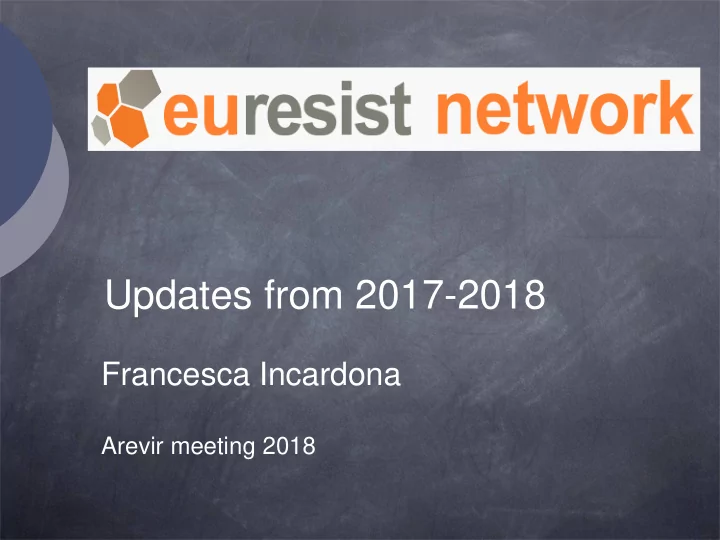

Updates from 2017-2018 Francesca Incardona Arevir meeting 2018
KRG-DHIS2 project ● EuResist is partner together with I-PRO of the project led by University of Rome Tor Vergata, funded by Italian cooperation, to set up a System of Health Monitoring and Surveillance activities in the Autonomous Region of Kurdistan.
AMS (ARCA Mentor School) 2017 ● EuResist supported I-PRO and University of Siena in the organisation of the 3 rd hands- on training on db querying for young clinicians and biologists ● The course was very successful: 4 abstracts accepted at ICAR, 3 abstracts accepted at European Resistance meeting
The EuResist Mentor School The program is divided in two phases: a face to face intensive session, and a 9/ 12- months remote follow-up phase. ● The on-site programme was held in Cologne… yesterday! ● Highly interactive: 8 hours of practice in small groups led by a medical trainer and a IT/ statistical trainer. Queries run on the EIDB. ● In the follow-up, remote phase, the queries will be refined, data analysed, results discussed and possibly prepared for publications
The EuResist Mentor School
The EuResist Mentor School The two queries: ● “Does resistance to nukes influence resistance to first line INSTIs?” ● “Efficacy of dual regimen as switch in patients with undetectable VL, including influence of previous resistance”
INTegrating Euresist Data base with intEGrase Resistance data for optimized Antiretroviral TrEatment ● Started in March 2017 ● Funded by Gilead ● The overall objectives are: ● To collect around 5000 complete integrase resistance instances ● Complete data instances are rewarded
To analyse data for several scientific studies: 1. Clinical and virological factors associated with virological outcomes of InSTI-containing therapies. 2. Prevalence of transmitted resistance to InSTIs and to other classes and its influence on InSTI treatment outcomes. 3. Durability - comparison of time to InSTI discontinuation due to side effects or drug-drug interactions using the different InSTI- based regimens, in naïve patients since 2015. 4. Reasons for RAL, EVG or DTG based discontinuation (for any reason), in naïve patients since 2015. 5. Prevalence of resistance to InSTI and to companion drugs in (I) patients failing InSTI-based first-line regimens, (II) patients switching to InSTIs while virologically suppressed and (III) treatment experienced patients starting InSTI with VL> 200 copies/ mL. 6. Efficacy and durability of combinations used in clinical practice and not fully tested in clinical trials.
● The first round of data collection completed ● Preliminary results presented at EACS 2017 in Milan. ● Project presented at the International HIV resistance workshop in Johannesburg, SA. ● Second round of data collection ongoing ● New collaborations in progress: with individual centres and with RESPOND (collecting clinical data from INSTI treated patients)
• 14,420 INSTI therapies collected in the EIDB • 2,794 standard datums (SDs) (1532 since 2012) • 777 SDs from previously drug-naïve pat. (687 since 2012) • 1,066 SDs from antiretroviral pretreated but INSTI- naïve pat. (369 since 2012) • 951 SDs from 620 INSTI-experienced pat. (398 since 2012) • Out of which 109 failures (67 pat.)(VL>200 cp/ml at >6 months from treatment start) (78 since 2012) .
collected standard datums 109 842 1066 777 INSTI-experienced failures INSTI-experienced not failing drug-naïve ART experienced INSTI-naïve
NGS • INTEGRATE NGS standardisation group • Led by Martin Obermeier and Marc Noguera (Irsicaixa) • Aiming at defining standard format for HIV NGS data exchange and storage in integrated (INTEGRATE) databases – linked with the international “Winnipeg group” • A survey has been launched on HIV NGS data generation, analysis, collection. PARTICIPATE AT : https://www.euresist.org/integrate-ngs-survey
EuResist-Africa Network Multinational data collection on the features of second-line ART failure in SSA Objectives 1) to describe the characteristics and the determinants of virological failure to second-line ART in Sub-Saharan African adult (age > = 18 y.o.) patients 2) to calculate the incidence of second-line failure 3) to identify causes of second-line treatment failure
EuResist-Africa Network
CARE project: Common Action against HIV/TB/HCV across the Regions of Europe H2020 call: Research on HIV, TB, HCV in patients with mono-, co-infections and/ or comorbidities in the context of fostering collaboration with the Russian Federation
CARE project: Common Action against HIV/TB/HCV across the Regions of Europe P ARTICIPANT ORGANISATION NAME C OUNTRY 1 EuResist Network (coordinator) (EuResist) Italy 2 REGIONH (CHIP) Denmark 3 Karolinska Institutet (KI) Sweden 4 University of Siena (UniSiena) Italy 5 University of Tubingen Germany 6 Forschungszentrum Borstel (FZB) Germany 7 Phtisiopneumology Institute Moldova 8 Imperial College UK 9 Vilnius University Clinic Lithuania 10 Public Health Center of the Ministry of Health Ukraine 11 Infectious Diseases, AIDS and Clinical research centre Georgia
CARE project: Common Action against HIV/TB/HCV across the Regions of Europe P ARTICIPANT ORGANISATION NAME C OUNTRY 12 Gamaleya Federal research centre for Russian epidemiology and microbiology of the Ministry of Federation health of Russia Moscow regional Center for the Prevention and Russian Control of AIDS and Infectious Diseases Federation St. Petersburg University Russian Federation Krasnodar Territory Clinical Centre for Prevention Russian and Control of AIDS Federation Far East Center for prevention and control of AIDS Russian and infectious diseases, Vladivostok Federation Northern State Medical University in Arkhangelsk Russian Federation
Anders Sonnerborg Andrea De Luca Maurizio Zazzi Rolf Kaiser Thomas Lengauer Antonia Bezenchek Thank Claudia Müller Joachim Büch Martin Obermeier Matthias Doering You Michael Böhm Simon Lennartz http:/ / w w w .euresist.org http:/ / engine.euresist.org Contact: f.incardona@inform acro.info 20
Recommend
More recommend